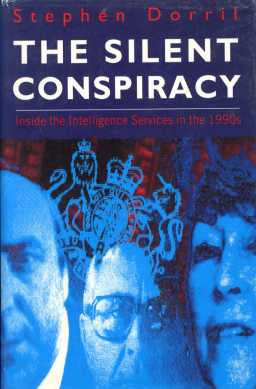Stephen Dorril
Heinemann, London, 1993
It turns out that the ‘silent conspiracy’ of the title is a conspiracy which ‘has surrounded Britain’s secret state’ — a blindingly obvious tautology. Dorril has done as much as any other to lift the veil of secrecy from the British secret state, so it is somewhat disappointing to read 474 pages only to find a conclusion which goes without saying. One reads such books as this to try and find out what ‘hasn’t‘ been said. Perhaps this is a minor niggle, perhaps it’s more about style than content, for in his first solo work Dorril has firmly imposed his grip on a wealth of facts which reaffirm his place as one of Britain’s leading exhumers of the modern ‘security and intelligence community’. Whilst some of the earlier chapters do go over old ground, the later chapters tread into so far uncharted areas.
This new ground, it is widely assumed, is going to be much less cosy for the security and intelligence services than before. The end of the Cold War, the increasing demand for accountablity, an end to all-round amateurism (how long before we see the ‘Rimmington Chair of Intelligence’ at some university? — not Cambridge, of course), the shrinking of public expenditure — the community at first sight appears to have its work cut out looking for a new ‘raison d’etre‘. There is an ironic possibility that Dorril is aiding them in this process. If he were a strategic management consultant, he might have been paid more for his book by Mrs Rimmington and her colleagues. Bringing his independent analysis to bear on the crisis of purpose facing the secret state should be welcomed by them as part of their bid for political acceptability.’
Perhaps I only say this because Dorril is such a mild and reasonable reformer, whose natural place is between dust jackets rather than in a flak jacket. There is no sense of outrage, nor even of surprise in ‘Silent Conspiracy‘. Why should there be? Dorril accepts that there is a need for something like a security cum intelligence agency, and he reiterates the familiar left demand for Parliamentary scrutiny. His thesis appears to me to be that if they did their job more intelligently, they could be a genuine bulwark of democracy. ‘Perhaps it is time for the ”sensible chaps” in MI6 to rescue their political initiatives’, Dorril concludes in his chapter on Ireland. This ‘sensibleness’ is the hallmark of the current reforms, which have resulted in copies of what amounts to MI5’s prospectus being flogged in good bookshops for £4.95. Sensibleness: doesn’t this strike a hollow tone?’
Silent Conspiracy was published round about the same time as Gary Murray’s Enemies of the State, a book much edited by solicitors, one imagines. Murray, enigmatic at the best of times, is nevertheless a valuable commentator on the Hilda Murrell killing. Dorril deals with the case, with sensibleness oozing from every serif, in his chapter ‘Mysterious Deaths, Deniable Operations and Private Spooks’, which begins: ‘Do the security services carry out assassinations? The simple answer is, we do not know.’ Such an answer — indeed such a question — reminds me of Patrick Moore on The Sky at Night. ‘Do assassinations occur on the dark side of the moon?’ The simple answer is, we do not know. Short of flying there of course, no one is going to know, and those who have the power to fly ain’t going to tell us. Dorril is terribly agnostic: my point is that he may be right to be so, but since his agnosticism adds little to the sum of knowledge on the issue, it could well have been left alone until more was known.’
On the other hand in ‘Shoot to Kill’, the author is convinced. Dorril writes: ‘Those who accuse the British government of a shoot to kill policy in Northern Ireland, in the sense of a deliberate plan to assassinate terrorists, tend to portray this as a newly instituted policy. This is not the case. It is not a recent development but a continuation of activities ‘which have been undertaken by elements of the secret state over the last fifty years ”(emphasis added). If fifty years is truly the timescale, dare I say that fifty years is long enough to inculcate a culture? Couldn’t it be that we have as a product of this culture (and attracted to it, indeed) a collection of what may be adequately described as ‘nasty bastards’? People who behave with as much regard for law and democracy as Peter Wright, but who chose coarser methods?’
The trouble with forming such a close relationship with his subject as Dorril has done is that some of its uglier facets can be obscured by his meticulous concern for evidence. That same evidence may well bury rather than inspire the campaign for reforms he espouses. The Matrix Churchill affair, I think will prove to be a case in point of this very same process.
Yet — and yet, there is for the avid buff a mountain of information in Silent Conspiracy which will excite. Naming the names in MI5’s Operational Order (1982) must be a necessary part of the process of depriving the secret state of its invisibility, even if it reads like an electoral register. Showing two fingers to the D Notice Committee must have given enormous pleasure.
What I want to know is: how may of these people are Nasty Bastards? Thanks to Dorril, we are a step closer to finding out, though it will take another Massiter, a Wallace or a Holroyd to get inside the citadel. I have not sought to damn Silent Conspiracy with faint praise, I Hope. Dorril’s contribution to research in this field has been immense. But Silent Conspiracy is trying to be something it is not. What polemic there is in the book seems out of place.’
Colin Challen
